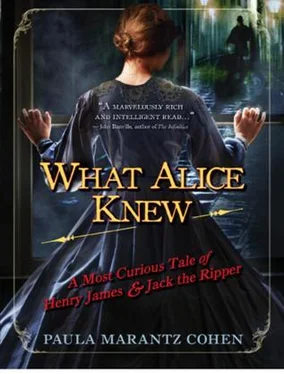“Yes.” William nodded. “There are exceptions to every rule. Now quiet as we can; we don’t want to scare Sally.”
They entered the shop. It was very still.
“Maybe they’ve left,” said Henry.
“Or we’re too late,” whispered William. “Keep a watch on the boy. I wouldn’t want him to find her if she’s…” He could not complete the thought.
The front room, where the principal operations of the shop were carried on, was a large space lit by high windows. Canvases in the process of being framed were laid out on a long table, and others, not yet framed or already completed, were propped against the wall. There was a great variety of pictures, including some that appeared old and valuable, no doubt the property of wealthy collectors like Asher Abrams.
The space itself was exceptionally neat and well organized. There were separate areas where the frames were cut, carved, and painted, with the necessary tools placed carefully at each station. The frames were stacked in orderly rows, saws and files were kept together, and varnishes and paints were lined up neatly on the shelves.
The three passed to the back of the room, and William tried the door. It was locked, and he nodded to Archie, who took out his piece of wire and again fiddled with the lock until it opened. They entered another room. Here there were no windows, so the area was dim. Henry gripped Archie’s hand, both because he genuinely had trouble seeing and because he feared they might find something from which he would need to shield the boy.
Despite the dim light, the contrast to the front room was immediately apparent. The place was a jumble of disorder. Scores of canvases lay about in unruly heaps, making it difficult to pass. At first it seemed like these might be additional inventory that would eventually make their way to the outer room for framing, but as the brothers moved farther into the space, they could see that what lay there would never be framed. The pictures had been destroyed, cut to tatters, so that the linen hung in strips from the wooden stretchers. They had once been paintings of women. Here and there one could make out an arm, a breast, or a torso that had escaped the knife, although mostly one saw only flesh-toned strips hanging from the wooden supports like flayed skin.
“My God!” said Henry with horror. To create under any circumstances was arduous—his worst moments as a writer came when he had to discard a work that refused to thrive. But to have one’s work fail again and again as it apparently had for Newsome—no wonder the man had gone mad. “It’s a graveyard,” he murmured.
“Newsome and the girl must have left,” said William, looking around the appalling space with relief and leading them back to the main part of the shop. They were about to leave when Henry pointed out a low door behind the framing table that they had not seen when they came in.
William walked over and turned the knob, which opened onto a steep flight of steps leading into a dark basement. A light from a lamp flickered below.
“Someone’s down there,” said William, trying to fight back a sense of dread. “Stay here.” He took a file from the table—it would serve as well as anything for a weapon—and descended the stairs. It was eerily silent, though the light from the lamp continued to shine dimly from somewhere in the recesses below.
At the bottom was a cavernous space dominated by a large wooden table. Rolls of cloth were arranged on shelves behind it, and piles of wood were bundled on the floor beneath. Hanging from hooks on the wall were knives of various sizes for cutting the cloth and wood for the creation of new canvases. If the space above were a graveyard, William thought, this was a birthing room. Each new canvas was like a life that had not yet been shaped by choice, a tabula rasa for the imprint of the imagination. Yet how fragile and short-lived was that innocent state. One touch of the brush and it was lost.
The light from the lamp was coming from the far end of the space, and William crept quietly to what he soon saw was an alcove, hardly bigger than a closet, abutting the far end of the room. He took a breath and looked inside.
The girl Sally was seated on a stool at the back of the alcove. She was undressed, not comfortable in being so, yet not ashamed either. She held herself with the sort of awkward pride that William recalled in the photograph of Polly Nichols. It was amazing how the idea of art aroused an instinctive reverence in people.
Hunched at an easel in front of the girl stood a slight man in glasses. Although he was turned so that only part of his face was visible, William knew at once that he had seen the man before. He was the bespectacled youth who had conferred with Asher Abrams about framing during dinner. There was another piece to the puzzle, then. Newsome must have overheard his questions about the De Quincey volume and then attacked him in the park afterward. He had had the image of Sickert as the attacker in his head for so long that it took him a moment to adjust to this revised image. Indeed, for the space of a few seconds, he could not do it. He could not replace the one figure with the other in his mind’s eye.
Newsome was painting in concentrated silence, yet even from the distance at which William was standing, he could see that the results were not promising. Newsome had drawn a preliminary sketch in keeping with Legros’s precepts, but the outline was shaky and uneven; it might have been the work of a child. And the brush, subject to regular bursts of movement, seemed beyond the control of the artist. William remembered having seen this sort of spasmodic activity in patients fixated on certain basic acts—washing their hands or buttoning their jacket—as if some outside force were compelling them to do these things against their will.
Sally turned her head. Perhaps she had heard a creak in the floorboards or was tired of holding one position, but whatever it was, her gaze shifted so that William entered her line of vision. She gave a sharp cry of surprise, scrambled from the stool, and grabbed for her clothes.
Newsome stopped his jabbing motion, his brush poised in midair. He seemed about to ask the girl what she was doing, and the look on his face seemed quizzical, until he suddenly registered the presence of an interloper. He turned sharply and faced William. “What are you doing here?” he demanded in a thin, reedy voice. It was a frightened whine, hardly the voice one would associate with a murderer. “Can’t a man paint a picture in peace?” His voice was pleading, and for a moment, William felt a great welling of sympathy for the slight figure before him and, with that sympathy, a fleeting doubt as to whether this poor soul could be guilty of such horrible crimes. There was hurt and fear in Newsome’s face, but not malevolence. Could the whole scene be an innocent one, a young man, sadly without talent, struggling valiantly to produce art?
Sally had run from the alcove and across the larger room to where Henry and Archie stood at the top of the stairs. The boy threw his arms round her.
“Go to Scotland Yard and tell them where you’ve been,” William called out loudly. “Wait for us there.” He had spoken with shrill authority, and he saw that his words had brought about a change in the visage of the figure before him. Newsome’s face, which had looked only sad and confused a moment earlier, contorted into an angry grimace.
The children had clambered out of the shop, but Henry descended the stairs into the basement and was approaching the area where Newsome stood. What happened next was rapid and dreamlike. With a quick, surprisingly determined movement, Newsome darted from the alcove, took a knife from a hook on the wall, and grabbed Henry by the collar of his jacket, pressing the knife to his throat. William did not have a chance to raise the file he had been holding. He remained planted where he was, his face blank with shock.
Читать дальше












